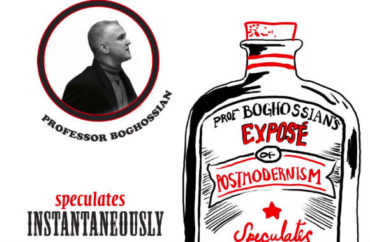
‘Journal reviewers and editors have never been considered part of human subjects research’
The biggest academic publishing story of last year was probably the “grievance studies” project that included Portland State University’s Peter Boghossian, who submitted intentionally bad papers to prominent academic journals to expose their low standards.
It was a more ambitious version of physicist Alan Sokal’s famous published hoax that claimed “quantum gravity was a social construct.” About a third of the journals accepted the papers Boghossian co-wrote before the hoax was exposed by The Wall Street Journal.
While the experiment divided academia, the less controversial question is whether PSU is right to take disciplinary action against the philosophy professor.
The Oregon Association of Scholars, the state affiliate of the National Association of Scholars, accused the public university of punishing a “whistleblower” who did nothing more than expose the “shameful lack of standards” in peer-reviewed journals “devoted to identity grievances and
ideological agitation.”
Led by Boghossian’s PSU colleague Bruce Gilley – himself investigated by PSU for several months, allegedly because of his pro-colonialism article – the OAS said Boghossian’s project was just a form of “stress-testing” common to field such as banking, “to determine the strength and reliability of safeguards.”
MORE: Boghossian violated ‘human subjects’ rule with ‘grievance studies’ hoax
The group mocked the university for its stated grievances against Boghossian – that he “fabricated” data that was on its face ludicrous, conducted unapproved “human subjects research” on academic journal editors and peer reviewers, and didn’t get institutional approval for a fake study of “rape culture” in dog parks.
Whether PSU eventually punishes Boghossian for wide-scale data fabrication, it has already punished him by preemptively nixing any research that involves him and halting any human subjects research PSU has not approved, OAS said:
These charges are bogus and ideologically motivated. Journal reviewers and editors have never been considered part of human subjects research protocols, not only because the scholar’s interactions with them are unforeseeable and separate from the research but also because the reviewers are anonymous. More generally, the hoax or satire based on concocted data that is later revealed to be such as part of the research is a fundamental and long-standing method of intellectual inquiry in the Western liberal tradition.
Boghossian should be “given a letter of commendation for his research efforts” and PSU should promote his work, OAS said. It also called on PSU trustees and state lawmakers to affirm that academic freedom includes “the right to conduct hoaxes,” and create an independent committee “to recommend reforms to strengthen academic freedom in Oregon public universities.”
Oregon Association of Schol… by on Scribd
MORE: Anonymous professors attack Boghossian as threat to PSU
Internationally known scholars have also weighed in to support Boghossian against PSU discipline.
As summarized by Reason, they include Harvard linguist Steven Pinker, former University of Oxford evolutionist Richard Dawkins and University of Toronto psychologist Jordan Peterson of “Intellectual Dark Web” fame. Even professors who believe Boghossian deserves some kind of punishment – Joel Christensen at Brandeis University and Jeffrey Sachs at Acadia University – don’t think he should be fired. (Boghossian does not have tenure.)
Robert Shibley, executive director of the Foundation for Individual Rights in Education, said PSU was abusing “institutional review boards” that universities are required to have by federal law:
As Columbia law professor Philip Hamburger, a prominent critic of the current role of IRBs, has pointed out, even oral history projects and opinion poll research, which simply consist of asking people for their own stories or opinions, can be subject to change or simply forbidden by IRBs. …
Particularly when removed from the medical context, it becomes all too easy for some fundamental IRB rules — such as the requirement that studies be done only with the informed consent of all human participants — to fail to work well. … [T]he IRB process would at the very least have required that the authors inform all of the potential “subjects” [journal editors and reviewers] that faked research papers were coming their way. Truly “informed” consent might have required rather more specificity than that. It doesn’t take a scientist (or a whole group of them on an IRB) to understand that such a restriction would make this particular research effort pointless, but PSU nevertheless determined that the research violated its rules and was worthy of discipline.
Shibley also argues that it “doesn’t make much sense” to treat the “grievance studies” project as academic fraud, since Boghossian and his co-authors “could not benefit in the traditional way from faking research results.”
They used pseudonyms and weren’t even scholars in the fields for which they submitted papers, and the “inevitable retraction” of the papers – after they exposed the hoax at the end, as intended – means there was no “potential damage to actual science,” Shibley says.
Read the OAS statement, Reason and FIRE posts.
MORE: Hoax trio gets woke version of ‘Mein Kampf’ published in feminist journal
MORE: From sexist potatoes to rape culture at dog parks
IMAGE: PSU Vanguard screenshot





Please join the conversation about our stories on Facebook, Twitter, Instagram, Reddit, MeWe, Rumble, Gab, Minds and Gettr.